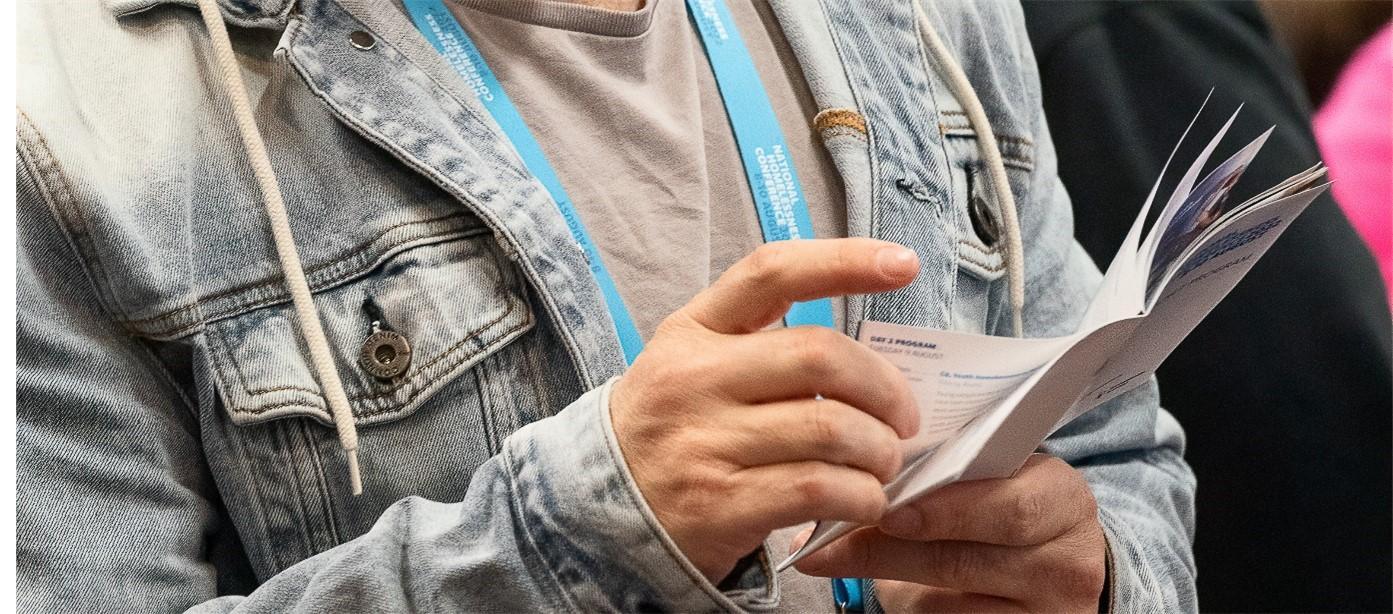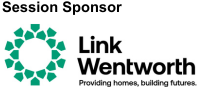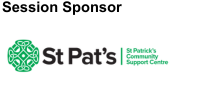
Program
Australian Homelessness Conference 2024
We are delighted to release the program for the Australian Homelessness Conference 2024, being held at the Adelaide Convention Centre 13 to 14 August 2024.
This year’s Gathering Momentum program is packed with case studies and practical examples of leading service responses, as well as discussions focused on system level reform and innovation. The program features a strong focus on addressing homelessness experienced by Aboriginal and Torres Strait Islander people, and on the integration of lived experience perspectives in program and policy design.
We are grateful to the members of the Program Advisory Committee, Aboriginal & Torres Strait Islander Working Group and Lived Experience Working Group for their advice and assistance in developing the program for this year’s conference.
The 2024 program is shaped to include diverse content withing the following streams:
- Aboriginal and Torres Strait Islander - content dedicated to addressing homelessness for Aboriginal and Torres Strait Islander people
- Best practices – examples in service delivery, advocacy, program and funding models, and policymaking
- Innovation – new tools, models and approaches for addressing homelessness
- Lived Experience practices – practical applications of models and approaches for integrating the voices of lived experience; and advice for practitioners
- Whole of System reform opportunities – the big picture issues, policies and reforms required for the greatest impact on ending homelessness in Australia.
Tuesday 13 August 2024
-
9.00am Welcome to Conference
Welcome to Conference
- Open: Dr Michael Fotheringham, AHURI
- Welcome to Country - Aunty Rosalind Coleman
- Hon Katrine Hildyard, Acting Minister for Human Services (South Australia)
-
9.35am Plenary 1: Echoes across the Pacific – in conversation with Jemine Bryon
This session will look at lessons the Housing and Urban Development department (USA) has learned about funding and financing homelessness responses in the US context; the integration of lived experience perspectives into decision-making; disaster recovery approaches to rehousing people following natural disasters – and how these approaches are being adapted to rehouse people experiencing rough sleeping; and the alignment of health and housing resources to address and prevent homelessness.
Speaker:
- Jemine Bryon, Housing and Urban Development Department, USA
Facilitator:
- Dr Michael Fotheringham, AHURI

-
10.30am Morning tea
Exhibition Precinct
-
11.00am Major Concurrent Sessions
MC1: Effective and innovative responses to domestic and family violence-related homelessness Domestic and family violence (DFV) is a key driver of homelessness for women and their children and young people, and numbers are increasing. This session will focus on effective and innovative responses to addressing homelessness for victim survivors of DFV.
Presenters:
- Gail Beck OAM, Ruah Community Services
- Elsie Blay, Ruah Community Services
- Shorna Moore, Melbourne City Mission
- Conor Pall, Melbourne City Mission
- Suzanne Paynter, Safe Steps Family Violence Response Centre
Facilitator:
- Shari McPhail, WAYSS
MC2: Providing meaningful responses when there is no housing
In the face of a persistent and dire housing crisis, how do services meaningfully support people experiencing homelessness when access to accommodation is severely limited. This session will explore learnings that can be replicated, and failings to avoid.Presenters:
- Tony Davies, Social Futures
- Laura Mahoney, Launch Housing
- Tameka Thompson, Hutt St Centre
Facilitator:
- Vicki Sutton, Melbourne City Mission
MC3: Evaluation for impactThe importance of robust assessments of homelessness policies and programs provides evidence to inform better homelessness policy and programs. This session will showcase a range of approaches to evidence the outcomes and impacts of homelessness interventions to understand what works and for whom and how this information can be used to end homelessness.
Presenters:
- Marion Bennett, Mission Australia
- Karen Hodgkiss, Homes Victoria
- Trudi Ray, Haven Home Safe
Facilitator:
- Ruth Ambler, Department of Human Services (SA)
-
12.30pm Lunch
Exhibition Precinct
-
1.30pm Plenary 2: Closing the gap – priorities and reforms for housing and homelessness
Plenary 2: Closing the gap – priorities and reforms for housing and homelessness
With surging numbers of Aboriginal and Torres Strait Islander people experiencing homelessness, this session explores specific homelessness service options that give voice to their experience of homeslessness and reveals a self-determined approach towards ending homelessness in the Aboriginal and Torres Strait Islander community.
Presenters:- Paul Coe, Birribee Housing
- Del Little, Wungening Aboriginal Corporation
- Daniel Morrison Bird, Wungening Aboriginal Corporation
- Neil Willmett, Aboriginal and Torres Strait Islander Housing Queensland
Facilitator: Paula Coghill -
3.00pm Afternoon Tea
Exhibition Precinct
-
3.30pm Concurrent Sessions
C1: Place based collaborations and solutions
Place based collaborations are an important mechanism by which to address homelessness and drive reform within the homelessness system. Place based approaches can also be designed to meet the needs of specific cohorts, such as women and children experiencing homelessness and the LGBTQI+ community. This session looks at how organisations and government can work together for best impact.
Presenters:
- Kath Buden, Teremok in association with Shelter NSW
- Orla Matthews, Adelaide North West Homelessness Alliance (UnitingSA)
- Jenna Nadiotis, Hume Community Housing Association
Facilitator: Julie Marsh, SA Housing Trust
C2: Shaping services and research with Lived Experience involvement and peer workThis session will share the lessons learned from involving people who have experienced homelessness in shaping policy and service delivery. It will also discuss the important role of peer workers in shaping policy.
Presenters:
- Michelle Debert, Communify Qld
- Claire Doherty, St Vincent's Hospital Melbourne
- Helen Matthews, Lived Experience Speaker
- Robyn Martin, RMIT University
- Matthew Scott, St Vincents Hospital Melbourne
Facilitator: Sonia Masciantonio, SYC Ltd
C3: Aboriginal led practiceThis session highlights the importance of Aboriginal-led homelessness responses. Aboriginal led responses recognise the transformative power of community building and are grounded in cultural learnings to deliver compassionate and culturally safe practices that ensure Aboriginal and Torres Strait Islander people’s unique needs are met in a respectful space and manner.
Presenters:
- Maria Anderson, The Salvation Army
- Pauline Boscato, St Patrick's Community Support
- Brett Goring, St Patrick's Community Support
- Suzanne Naden, Bungree Aboriginal Association
- Amielia (Millie) Wall, Kirrip
Facilitator: Monique Wiseman, Birribee Housing
C4: How private rental is being accessed and sustainedPrograms to transition people from emergency accommodation and refuges often rely on the private rental market. This session considers private rental subsidy and support schemes for people facing insecure housing outcomes but who do have some capacity to support themselves in private rental housing.
Presenters:
- Laura Mahoney, Launch Housing
- Nicole Peterman, Mission Australia
- Carley Thomas, Toora Women
Facilitator:
- Raquel Carvajal, Homes NSW
C5: Better homelessness responses for under-served groups Every day, Australia’s homelessness services face the harsh reality of trying to assist people in the context of few if any housing options and highly constrained supports that are appropriate to their situations. This session explores solutions that: support unaccompanied children; assist women to move from incarceration to community living; and help people without residency status in Australia.
Presenters:
- Bam Bunyalak, St Vincent's Health Network
- Sophie Davies, Catherine House
- Erin Longbottom, St Vincent's Health Network
- Cristy Pamment, Catherine House
- Dr Catherine Robinson, University of Tasmania
Facilitator:
- Kate McGarry, Baptist Care SA
C6: Think Local
An increasing number of local governments have been finding their place in homelessness response efforts and advocacy to other levels of government. This panel discussion will consider what exactly can and should local government contribute toward our country’s efforts to end homelessness?Presenters:
- Ilia Houdiris, City of Adelaide
- Leanne Mitchell, Local Government Consultant
- Linda Page, City of Launceston
- Naomi Spooner, City of Moreton Bay
- Barney Wilson, City of Melbourne
Facilitator:
- Emma Greenhalgh, National Shelter
-
5.00pm Welcome Reception
Exhibition Precinct, Adelaide Convention Centre
Wednesday 14 August
-
6.30am Beyond Bank Networking Breakfast: Conversation with Dr Gregory Smith
A conversation with Dr Gregory Smith facilitated by Tory Shepherd, The Guardian

-
9.00am Welcome to Day 2
Welcome to day 2
-
9.15am Plenary 3: Working together to end homelessness - away and at home
Plenary 3: Working together to end homelessness – away and at home
The phrase ‘Ending homelessness’ is increasingly used in Australia, and has been widely adopted internationally. However, we need clear definitions and a real understanding on how to deliver it. Featuring international perspectives, this session explores how we can create systemic change to make homelessness rare, brief, and non-recurring.
Presenters:- Tim Richter, Canadian Alliance to End Homelessness [Keynote]
- Carmel Haugh, Micah Projects
- David Pearson, Australian Alliance to End Homelessness
Facilitator: Dr Tom Alves, AHURI

-
10.45am Morning tea
Exhibition precinct
-
11.15am Major Concurrent sessions
MC4: Commissioning and funding services to deliver the best outcomes
This session explores commissioning strategies that build on the strengths and resources of service providers, specialists, lived experts, communities, governments, and the many collaborative partners who contribute to the health and wellbeing of people facing homelessness.Presenters:
- Rhubee Neale, Toward Home Alliance (Adelaide SE Alliance)
- Shaya Nettle, Toward Home Alliance (Adelaide SE Alliance)
- Jessie Robinson, Homelessness NSW
- Clare Rowley, SA Housing Authority
Facilitator: Marion Bennett, Mission Australia
MC5: Cultural right to mobility
This session explores the concept of mobility and approaches to support mobility in a contemporary context. It will offer firsthand insights and tangible solutions, derived from on-the-ground experiences, to cultivate a community-driven approach to homelessness that respects cultural values and effectively addresses housing challenges.Presenters:
- Natalie Clark, Homes NSW
- Aaron Ken, SA Housing Trust
- Zac Matysek, NATSIHA
- Skye Thompson, Aboriginal Housing NT
Facilitator: Stacey Broadbent, Aboriginal Community Housing Limited
MC6: Embedding Lived Experience in policy – challenges and opportunities
The session explores what has been learnt from including people with lived experience in policy and program design. The session will discuss how organisations can embrace people with lived experience to work with them and to drive improved outcomes for people experiencing homelessness.Presenters:
- Duncan Bainbridge, Lived Experience Reference Group
- Ian Campbell, Street Up
- Skye Constantine, University of Queensland
- Alan Earls, Public Interest Advocacy Centre (PIAC)
- PJ Humphreys, Sunshine Coast Council
- Charmaine Jones, Public Interest Advocacy Centre (PIAC)
- Dr Sonia Masciantonio, SYC
- Christine Thirkell, Lived Experience Speaker
Facilitator:
- Shorna Moore, Melbourne City Mission
-
12.45pm Lunch
Exhibition precinct
-
1.45pm Concurrent Sessions
C7 Overcoming barriers to accessing health services
People experiencing homelessness have higher rates of emergency department presentation and hospital admission. This session explores evidence that improving access to healthcare through outreach programs, delivering vaccines in trusted community places, and protecting this vulnerable population from weather-related illness reduces Emergency Department presentations and improves health outcomes.Presenters:
- Noah Bray, Brisbane South PHN
- Dr Anne Jenkins, ACT Health Directorate
- Leanne Papas, Micah Projects
- Jon Swain, Sydney City Council
Facilitator:
- Lauren Moulds, Department of Human Services (SA)
C8 Designing housing for women and children fleeing domestic and family violence
This session explores how to build the best models of housing for people escaping domestic and family violence (DFV). Rather than the traditional shared house environment, this session will discuss use of the core and cluster model and a new innovative model providing flexibility to services and users.Presenters:
- Dr Deb Batterham, Swinburne University of Technology & Launch Housing
- Marcus Baumgart - BCBA Studio
- Janet Saunders, Hobart Women's Shelter
Facilitator:
- Dr Tom Alves, AHURI
C9 Reducing homelessness following institutional exits
People leaving institutions and institutional care have disproportionately high rates of homelessness. This session focusses on learnings from programs aimed at preventing people from cycling back into homelessness, including the importance of cross agency and collaborative governance.Presenters:
- Regina Brady, Community Restorative Centre
- Rob Seaton, Wesley Mission
- Ricky Skiathitis, RSL Care
Facilitator:
- Shaya Nettle, Toward Home Alliance (Adelaide SE Alliance)
C10 Practical examples of Lived Experience at work
The inclusion of lived experience voices and expertise is still nascent in the Australian homelessness sector and policy. This session shares practical examples of how the voices of people with lived experience of homelessness can be included and how their voices enrich service delivery and planning.Presenters:
- Tamina Boundey, Sonder Care
- Lisa Kosandiak, Sonder Care
- Michelle Moss, Queenslanders with Disability Network
- Brooke Oliver, Australian Alliance to End Homelessness
- Lorna Robinson, Australian Alliance to End Homelessness
- Dr Gregory Smith, Southern Cross University
- Jasmen Youldale, Queenslanders with Disability Network
Facilitator: Fiona Curnow, SA Housing Trust
C11 Rowing in the same direction – optimising partnerships
Support programs working in partnership with governments are important to alleviating homelessness, particularly when they are targeted in specific locations. This session shares the lessons learned from four initiatives to suggest what worked and did not work, and how these lessons can inform the development of similar models in other regions.Presenters:
- Rebecca Duell, Brisbane Youth Service
- Jennifer Joynt, Kāinga Ora - Homes and Communities
- Jane Jujnovich, Kāinga Ora - Homes and Communities
- Fiona Oates, Q Shelter
- Leah Watkins, Housing Choices WA
Facilitator:
- Dr Renée Lane, AHURI
C12 Intervening early to prevent homelessness
Providing support at the right time can prevent and reduce homelessness by lowering barriers to maintaining housing, increasing the speed of obtaining accommodation, and alleviating pressure on the homelessness service system. This session looks at system level strategies to reduce the number of people falling into homelessness.Presenter:
- Brad Kelly, Homes Tasmania
- Fiona Caniglia, Q Shelter
- Kate Ihanimo, Centrecare
Facilitator:
- Sandy Pitcher, Department of Human Services (SA)
-
3.15pm Afternoon tea
Exhibition Precinct
-
3.45pm Plenary 4: Where to from here for the Australian homelessness system
Plenary 4: Where to from here for the Australian homelessness system
A panel of leaders in homelessness across Australia will reflect on ‘what’s next’ for the Australian homelessness system, and discuss key priorities moving forward.Presenters:
- Deb Buckskin, South Australian Aboriginal Community Controlled Organisations Network
- John Engeler, National Shelter (ShelterNSW)
- Rachel Hunter, Independent Reviewer, Queensland homelessness responses
- Dom Rowe, Homelessness NSW
Facilitator: Emma Rebellato, ABC
-
5.00pm Conference close
Wrapping up the conference

